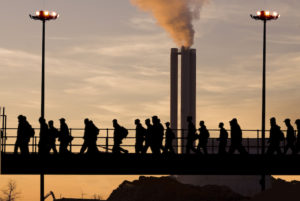
OSHA pauses its COVID-19 vaccination standard, President Biden directs agencies to prevent violence against Native Americans, and more…
IN THE NEWS
- A federal appeals court granted an order to temporarily block the Occupational Safety and Health Administration’s standard that required companies with 100 or more employees to implement COVID-19 vaccination policies. In response to the order, the Occupational Safety and Health Administration announced that it will pause the enforcement of its standard. The Biden Administration reportedly encouraged employers to implement the rule anyway in spite of the court order.
- President Joseph R. Biden signed an executive order directing the U.S. Department of Justice, the U.S. Department of the Interior, and the U.S. Department of Homeland Security to coordinate a federal effort in preventing and responding to violence against Native Americans. In the order, President Biden pledged to assist Tribal governments and law enforcement in responding to violence, particularly violence against Native women, and directed the U.S. Secretary of Health and Human Services to improve data collection, information, and remediation processes surrounding violence against Native Americans.
- The U.S. Department of Labor proposed rescinding a Trump Administration rule that increased religious exemptions to anti-discrimination laws for federal contractors. The Biden Administration’s proposal represents a return to the policy the Labor Department followed under both the George W. Bush and Obama Administrations. In 2019, the Trump Administration broadened the religious exemption rules, arguing that religious organizations had been “reluctant to participate as federal contractors” under the prior rule. The Biden Administration’s proposal noted that since the Labor Department started keeping records on the subject in 2004, no federal contractor had requested a religious exemption.
- The U.S. Food and Drug Administration (FDA) is reportedly expected to authorize booster shots of the COVID-19 vaccine for all adults 18 and older by the end of the week. Moderna filed for emergency use authorization for its vaccine a week after Pfizer and BioNTech submitted a similar application. The Centers for Disease Control and Prevention is expected to meet Friday to discuss the eligibility of booster shots, pending FDA approval. Booster shots for individuals who previously received the Moderna or Pfizer vaccine are currently limited to those 65 and older and adults in particularly high-risk settings.
- The U.S. Senate confirmed Willie Phillips as a commissioner of the Federal Energy Regulatory Commission. Phillips’s confirmation established a Democratic majority on the Commission, with three Democratic and two Republican commissioners. During his testimony before Congress, Phillips stated that he would “seek balance” between political parties in his approach to his role.
- The Interior Department announced measures to protect the Chaco Culture National Historical Park. The park is located in northwestern New Mexico and is one of only a handful of UNESCO World Heritage Sites in the United States. As part of the announced measures, the Bureau of Land Management will begin the process of withdrawing any land within a ten-mile radius of the park from consideration for oil and gas leasing. U.S. Secretary of the Interior Deb Haaland—herself a member of the Pueblo of Laguna in New Mexico—called the park a “sacred place” for many Indigenous peoples in the department’s announcement. The ban on oil and gas leasing would last for 20 years.
- The U.S. Securities and Exchange Commission (SEC) finalized a universal proxy rule, which allows investors who vote by proxy, rather than in-person, to vote for different combinations of directors who are competing against each other. Previously, only investors voting in person could endorse directors running as part of competing slates. SEC Chair Gary Gensler praised the rule as “an important aspect of shareholder democracy” because it affords proxy voters the same freedoms as in-person voters. Meanwhile, SEC Commissioner Hester Peirce cautioned that this universal proxy rule may “afford activists without a demonstrated commitment to the company an opportunity to meddle” in its affairs.
- A federal appeals court reinstated a rule banning certain types of lobster fishing techniques, from October through January annually, off the coast of Maine. The National Marine Fisheries Service had implemented the rule to protect right whales—one of the most endangered species of large whales—from becoming trapped in the lines between lobster traps and buoys. The appellate court reasoned that, although plaintiff fishermen would experience a “certain risk of economic harm,” the National Marine Fisheries Service was acting within its authority in issuing the lobster fishing ban.
WHAT WE’RE READING THIS WEEK
- In a recent working paper, James Lake, professor at Southern Methodist University, and Ding Liu, Ph.D. candidate at Southern Methodist University, discussed the labor market impacts of the Bush Administration’s imposition of steel tariffs. In 2002, the Bush Administration argued the tariffs were necessary to protect American industries. Lake and Liu found that the 2002 tariffs hurt employment in industries that relied on steel as an input and that there was no “economically meaningful” increase in steel industry employment. Lake and Liu also found that the impacts of the tariffs outlived the tariffs themselves because of the long-term impacts on the labor markets in steel-related industries.
- In a forthcoming article in Law & Method, Sofia Ranchordas, professor at the University of Groningen, argued that experimental regulations and regulatory sandboxes—short term legal regimes that test the efficacy of new policies—that are poorly designed and implemented pose challenges when used in lawmaking. Problems arise, Ranchordas explained, because regulatory experiments often do not present clear results, can convey a misleading sense of objectivity, and are intrinsically tied to the soundness of the experiment’s scientific methodology, which can lead to both legal and scientific criticism. Ranchordas concluded that lawmakers should model experimental regulations in law and policy after existing field experiments in social science because of their more sound methodological approach.
- In a working paper, William R. Cline, senior fellow at the Peterson Institute for International Economics, advocated a consumer tax on meat and cow milk based on their carbon emissions to reduce greenhouse gas emissions from livestock. Cline explained that methane and nitrous oxide production from organic processes—and not carbon dioxide from fossil fuel use in processing—accounts for 99 percent of livestock-sector greenhouse gases in the United States. Cline estimated that a carbon-equivalent tax on beef would amount to a rate of 20.1 percent, based on the carbon emissions associated with beef production. Cline also estimated that for cow milk, pork, and chicken, the carbon-equivalent taxes amount to rates of 4.1 percent, 2.7 percent, and 2.9 percent, respectively. A carbon-equivalent tax on meat, Cline cautioned, would disproportionately impact households from lower income backgrounds, for which consumption costs drive a larger proportion of annual spending.
FLASHBACK FRIDAY
- In an essay in The Regulatory Review, Cynthia R. Harris, director of tribal programs at the Environmental Law Institute, argued that Indian tribes have options to exercise tribal sovereignty through forest and fire management. Harris noted that Indigenous peoples’ forest management practices are in contrast with federal fire management policies but explained that opportunities for collaboration, including the Tribal Forest Protection Act, could lead to “better forest stewardship.” Harris also argued that the expansion of Good Neighbor Authority—which facilitates agreements between federal and state forest agencies to carry out restoration projects—to tribes could provide additional sources of collaboration and funding to facilitate tribal authority over forest management.



